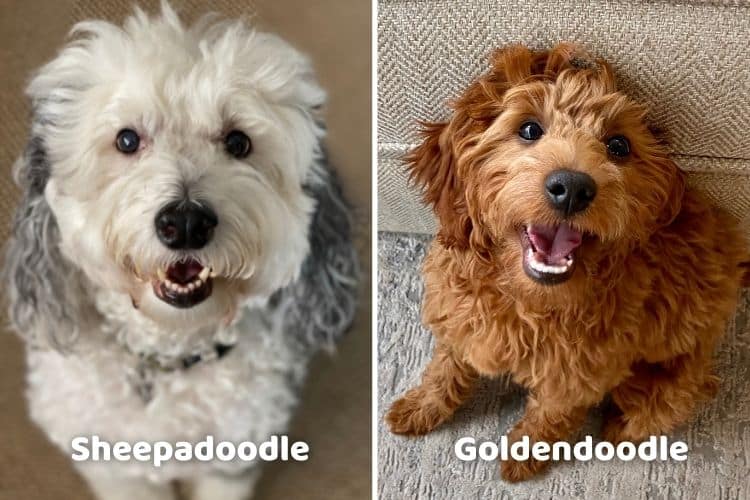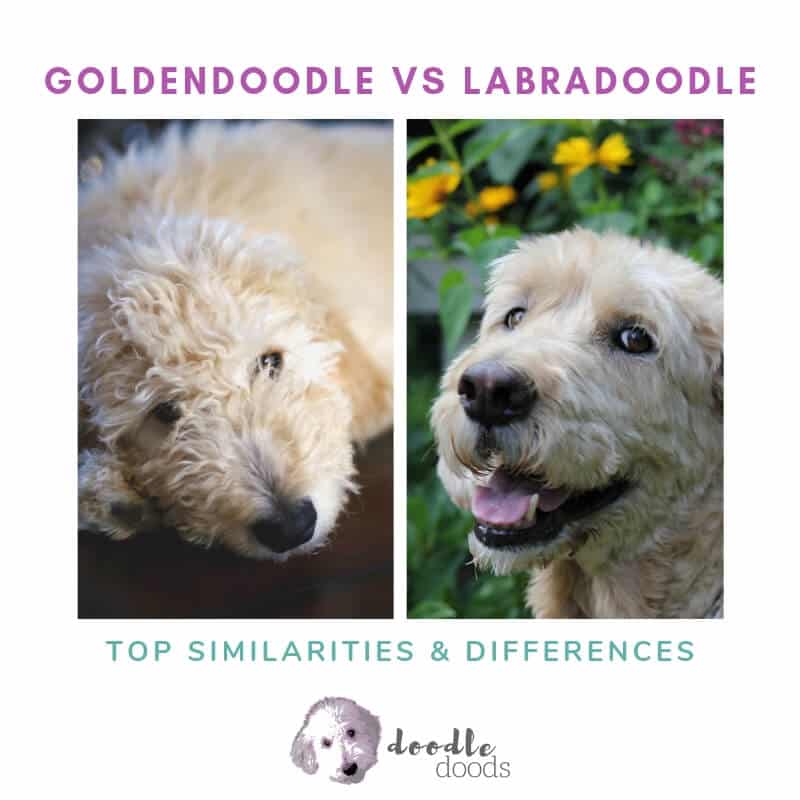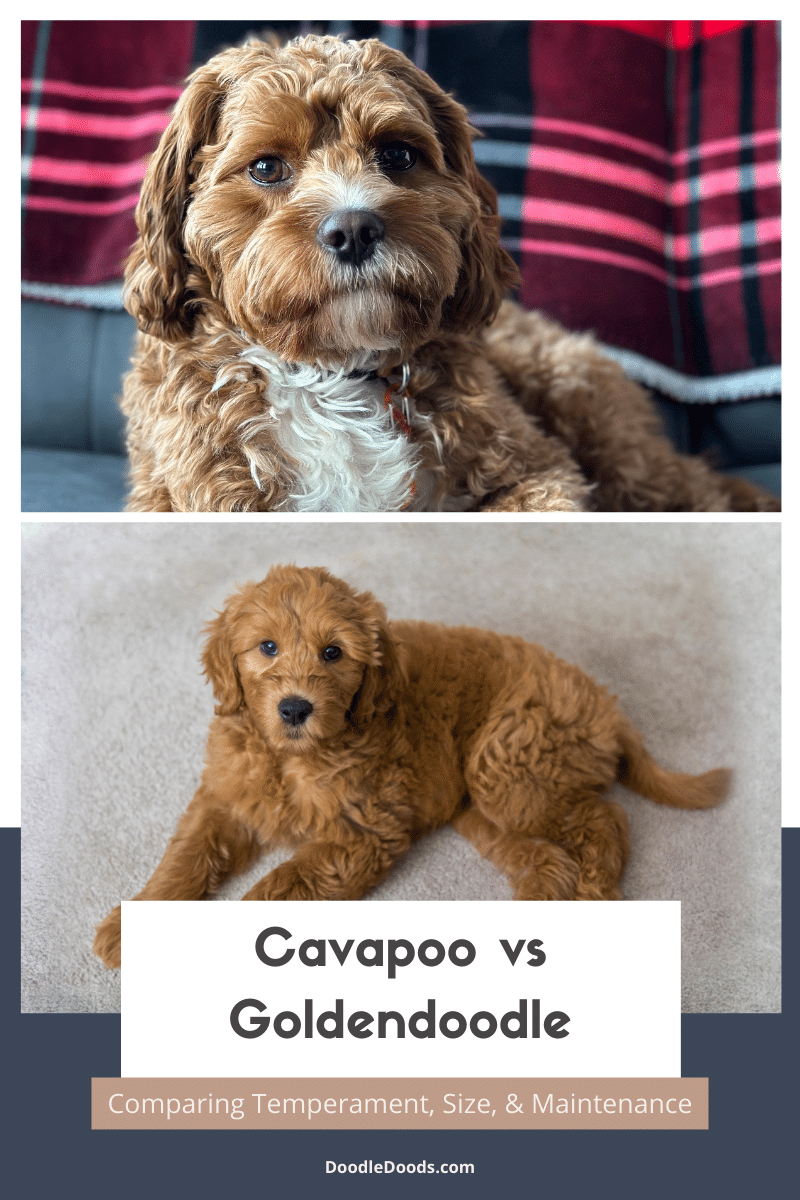The Sheepadoodle vs Goldendoodle – which one is the right companion for you? In this article, we’re going to answer exactly that question. We’re going to cover their differences in size, appearance, personality, grooming, maintenance, health, and everything else about these two gorgeous Doodle breeds. Let’s dive in!
Table of Contents
- About Sheepadoodle: History & Key Characteristics
- About Goldendoodle: History & Key Characteristics
- Sheepadoodle vs Goldendoodle: Size
- Sheepadoodle vs Goldendoodle: Temperament & Personality
- Goldendoodle vs Sheepadoodle: Appearance
- Sheepadoodle vs Goldendoodle: Grooming & Maintenance
- Goldendoodle vs Sheepadoodle: Health & Wellness
- Goldendoodle vs Sheepadoodle: Lifespan
- Sheepadoodle vs Goldendoodle: Training & Environment
- Sheepadoodle vs Goldendoodle: Cost
- Sheepadoodle vs Goldendoodle: Are They Family Friendly?
- Sheepadoodle vs Goldendoodle: Frequently Asked Questions
- Sheepadoodle vs Goldendoodle: Which Is The Right Pup For You?
About Sheepadoodle: History & Key Characteristics
The Sheepadoodle is a hybrid cross between the Old English Sheepdog and Poodle. Like other Poodle mixes, these Doods have plenty of fun names to choose from. They’re often also referred to as the Sheepapoo, Sheepdoodle, Sheeppoo, or Sheepdogpoo.
The Sheepadoodle has gained much popularity since the 1980s. Today, they’re one of the most coveted Doodle breeds thanks to their unbelievably cute looks, amazing temperament, and super shaggy, yet low-shedding coats.
In fact, the Sheepadoodle might just be one of the most recognizable dogs out there. They’ve inherited their extremely fluffy coats from the Old English Sheepdog parent, and they often have a quite large stature. But thanks to the Poodle genes, they don’t shed nearly as much as the Old English Sheepdog. Indeed, the Sheepadoodle looks like a true, real-life teddy bear.
Speaking of their size, the Sheepadoodle comes in three size variations – the Standard, Mini/Medium, and Toy Sheepadoodle, the former being the largest, and the latter being the smallest of the bunch. So, if you don’t have enough space to accommodate a large Standard Sheepadoodle, a smaller Mini or Toy Sheepadoodle might just be the right choice for you.

About Goldendoodle: History & Key Characteristics
The Goldendoodle probably needs no introduction. The Goldendoodle is a hybrid cross between the Golden Retriever and Poodle. Today, the Goldendoodle is one of the most popular, well-known Poodle mixes. They make equally great family pets, but also wonderful therapy and service dogs.
The Goldendoodle was first created some time in the 1960s to achieve a hypoallergenic guide dog. Although the Golden Retriever is a pretty perfect dog in its own right, its shedding coat means that they’re not the ideal choice for people with allergies. But thanks to the Poodle genes, the Goldendoodle has the same amazing qualities as the Golden Retriever, minus the shedding coat.
Just like the Sheepadoodle, the Goldendoodle is a highly intelligent, affectionate, and friendly companion. The Goldendoodle is also quite an energetic, fun-loving, and playful dog. They love to play, run, go for walkies, and make new friends wherever they go.
The Goldendoodle also comes in different sizes – the Toy, Mini/Medium, and Standard. Due to its large size, the Standard Goldendoodle is better suited for more spacious homes with fenced backyards. On the other hand, the smaller Mini and Toy Goldendoodles can thrive perfectly well in an apartment setting, provided that they get plenty of exercise throughout the day.
Sheepadoodle vs Goldendoodle: Size
As we briefly mentioned, both the Sheepadoodle and Goldendoodle come in three different size categories – Toy, Mini/Medium, and Standard.
Obviously, it’s somewhat difficult trying to predict the size of a Doodle puppy, as we can never know for sure how these pups may turn. On the other hand, we can make some pretty accurate guesstimates based on the parents’ sizes.
Both the Old English Sheepdog and Golden Retriever are large-sized dogs, the Old English Sheepdog being slightly larger than the Golden Retriever. On top of that, the Poodle used in the mix gives us a great hint about the size of the pups.
Both Sheepadoodles and Goldendoodles can be created with either Standard, Miniature, or Toy Poodles. As you can probably guess, the size of the Poodle used in the mix determines the size of the puppies.
So, let’s take a closer look at the Sheepadoodle vs Goldendoodle size comparison:
| Sheepadoodle | Goldendoodle | |
| Toy | 10-25 pounds Up to 15 inches tall | 10-25 pounds Up to 15 inches tall |
| Mini | 25-35 pounds 15-18 inches | 25-35 pounds 15-17 inches |
| Medium | 35-55 pounds 19-22 inches | 35-50 pounds 17-20 inches |
| Standard | 55-85 pounds 22-27 inches | 50-90 pounds 20-26 inches |
In terms of the Goldendoodle vs Sheepadoodle size, we can see that they actually come in a very similar size range. However, the smaller variations of the Goldendoodle are currently more widely available compared to the smaller Mini and Toy Sheepadoodles.
Sheepadoodle vs Goldendoodle: Temperament & Personality
When it comes to the Sheepadoodle vs Goldendoodle temperament and personality, it’s going to be a tough choice. They’re both outgoing, friendly, intelligent, and loving dogs. Both of them are also relatively energetic, making them perfect family companions for active people and families.
Even though Sheepadoodles and Goldendoodles both require plenty of exercise each and every day, the Sheepadoodle is known to be somewhat more laid-back compared to the always excited Goldendoodle. Nonetheless, they’re both praised for their ability to be loving with every single member of the family. They’re also goofy, meaning that you’ll never get bored with either of these Doods.
However, due to their affectionate nature and ability to bond so well with their humans, both Sheepadoodles and Goldendoodles are prone to separation anxiety. If you’re considering either of these dogs, you should know that leaving them home alone for long hours is a big no-no.
All in all, the Sheepadoodle and Goldendoodle are amazing companions, provided that you’ve done everything on your end to raise a healthy, happy, well-rounded, and confident dog. What many people fail to realize is that behavioral problems often stem from improper training and socialization. But more on that later on in this article.
Goldendoodle vs Sheepadoodle: Appearance
When it comes to the Sheepadoodle vs Goldendoodle appearance, the Goldendoodle is well-known for its distinctive teddy-bear look, often referred to as the original Doodle look. Meanwhile, the Sheepadoodle usually sports a super shaggy and fluffy coat.
Like other Doodles, Goldendoodles and Sheepadoodles can flaunt a wide variety of coat colors and patterns inherited from both of their parents. Most commonly, Sheepadoodles sport the bi-colored Old English Sheepdog inspired coats that are primarily white along with darker markings.
You’ll be able to find Sheepadoodles in different colors and patterns, such as black and white, gray, silver, blue, black, brown, red, fawn, cream, merle, sable, and grizzle. In addition to that, Sheepadoodles often fade lighter as they age. This usually happens some time between their 6 and 12 month mark.
Although the Golden Retriever usually comes in its signature golden hues, the Poodle genes definitely mix things up a bit. Goldendoodles can sport various coat colors, such as chocolate, apricot, cream, champagne, black, black and white, gray, blue, silver, silver beige, tan, and white.
Sheepadoodle vs Goldendoodle: Grooming & Maintenance
The great thing about Poodle mixes is that they’re generally very low-shedding dogs, even hypoallergenic, many would say. In terms of their grooming requirements, there isn’t a clear winner in the Sheepadoodle vs Goldendoodle debate. They’re both rather high maintenance and they need their daily brushing sessions, weekly nail trims, occasional haircuts, and bath time.
The coat type your Dood inherits can largely determine how much daily upkeep they require. Since we’re talking about crossbreeds, it’s crucial we remember that these pups can inherit their traits from both of the purebred parents. If they lean more on the Poodle side of the lineage, we can expect them to come with curly, minimally shedding coats. However, the curly coat is the most prone to matting, meaning that these pups need to be brushed every single day.
On the other hand, if a Doodle takes more after the other purebred parent, there may be some shedding. Although these coats may be slightly easier to manage on a daily basis, it’s something any future Doodle owner should keep in mind, especially if you have dog allergies.
In fact, Old English Sheepdogs are very heavy shedders. So, if you’re keen on getting a Sheepadoodle, but aren’t a fan of loose dog hair around the house, a curly-haired Sheepadoodle would likely be a better option for you.
You’ll also want to consider your dog’s generation. For instance, first-generation or F1 Doodles can lean on either side of their lineage. Of course, some F1 pups also come with a wavy combination coat that’s usually the easiest to manage. The wavy coat typically doesn’t shed that much either. But, if you’re looking for a very low to non-shedding Dood, look for backcross generations like the F1b, F1bb, F2b, and F2bb.
Goldendoodle vs Sheepadoodle: Health & Wellness
Just like they inherit their looks, personality, and coat type from their parents, the same goes for their health. However, one of the most appealing things about Doodles (and any crossbreed for that matter) is that they’re often healthier than their purebred parents.
That’s all thanks to hybrid vigor, a common occurrence in hybrid breeds. Hybrid vigor indicates that crossbreeds have superior health compared to their purebred parents, and they’re less likely to inherit breed-specific genetic conditions.
But that’s not the only reason why Doodles are considered healthier. Ethical Doodle breeders conduct extensive health and genetic testing on their breeding dogs to make sure that none of them are carriers of any serious genetic conditions. As a result, their puppies are generally healthy and come from strong bloodlines.
Nevertheless, there are still certain health conditions that Sheepadoodles and Goldendoodles are at risk of. Mainly, the ones that are common in Poodles, Golden Retrievers, and Old English Sheepdogs.
Most common health issues in Goldendoodles include joint problems like hip dysplasia, elbow dysplasia, patellar luxation, and eye diseases like PRA and cataracts. Goldendoodles are also prone to Addison’s disease, von Willebrand’s disease, sebaceous adenitis, and subvalvular aortic stenosis. Sheepadoodles are also at risk of joint problems, eye diseases, Addison’s disease, and Cushing’s disease.
Additionally, Sheepadoodles and Goldendoodles are both prone to digestive issues, food intolerances and allergies, skin sensitivities and allergies, and ear infections.
Goldendoodle vs Sheepadoodle: Lifespan
Thanks to their generally good health, Sheepadoodles and Goldendoodles tend to live long lives of 12 to 15 years on average. As a general rule of thumb, the smaller the dog, the longer the life expectancy. So, it’s not uncommon for Mini and Toy Doodles to outlive their larger Standard-sized counterparts.
Of course, the key to providing your pup a long, healthy, and fulfilled life lies in a healthy lifestyle. You’ll want to feed your pup a high quality, nutritious, and balanced diet. Also, make sure that you feed your dog the right amount of food to prevent obesity. By the way, we’ve reviewed some of the best dog food formulas for Goldendoodles here and for Sheepadoodles here.
In addition to that, your pup should also get plenty of daily exercise, and lots of cuddles and kisses every single day. After all, these pups thrive in human company. What a better way to keep them happy than giving them lots of attention and affection all day every day!
Sheepadoodle vs Goldendoodle: Training & Environment
When comparing the Sheepadoodle vs Goldendoodle trainability, both Doods rank in high with their high levels of intelligence. As a result, they’re often very easy to train, as they tend to pick up new tricks and habits rather quickly. They’re also eager to please, making the whole process of learning good manners that much easier.
But, as we mentioned earlier, it’s your responsibility as a dog owner to raise your new puppy into a well-behaved adult. To do that, you’ll want to start with early socialization, obedience training, potty training, and crate training as soon as you bring your new puppy home.
Moreover, as both of these Doodles are extremely smart and also energetic, they need lots of mental and physical stimulation each day to keep any unwanted, even destructive behaviors at bay. Think of daily walkies, playtime, but also lots of mentally stimulating activities, such as puzzle games and interactive dog toys.
In terms of home life, the size of your Dood is what you should pay attention to. As we mentioned earlier, larger Standard Goldendoodles and Standard Sheepadoodles would live their best lives in more spacious homes with fenced backyards, where they have plenty of space to romp around and play. In contrast, smaller Mini and Toy Doodles can just as well thrive in smaller homes, even in apartments.
Sheepadoodle vs Goldendoodle: Cost
Doodles like the Sheepadoodle and Goldendoodle are extremely in-demand. Therefore, you can expect to pay quite a hefty amount for these puppies. In the US, the average price for a Doodle puppy starts from $1500, and can go upwards to $5000 in some cases. It’s also not uncommon for some breeders to charge more for smaller Mini and Toy Doodles. Check out our guides on Sheepadoodle puppy prices and Goldendoodle adoption prices for more detailed price breakdowns.
Understandably, you have to carefully budget for a Doodle puppy. These pups do not come cheap! But, under no circumstances should you make it your goal to find a puppy for a much cheaper price. That’s exactly what Doodle scammers and puppy mills are betting on – to attract unknowing customers with their extremely low prices. Unfortunately, their puppies often come with serious health issues, which can often lead to an untimely death.
So, if you’ve decided to adopt a Sheepadoodle or a Goldendoodle, be sure to do your research and only opt for an ethical breeder that follows responsible breeding guidelines. You can learn more about this topic from our full in-depth guide on How To Choose A Responsible Breeder.
Sheepadoodle vs Goldendoodle: Are They Family Friendly?
At this point, we’ve established that both Goldendoodles and Sheepadoodles are excellent family companions. They both tend to get along well with people of all ages, including children. They also seem to be great with strangers, especially the super excitable Goldendoodle.
On the other hand, thanks to its high energy levels, the Goldendoodle might be a bit too much to handle for smaller, younger children. And even though Sheepadoodles can be somewhat calmer than Goldendoodles, they may inherit a tendency to herd from their Old English Sheepdog parent. Again, this could pose a slight issue for families with smaller kids.
All in all, both Goldendoodles and Sheepadoodles make amazing family pets. However, you’ll want to keep an eye on your dog and kids at all times to avoid any unexpected accidents.
Sheepadoodle vs Goldendoodle: Frequently Asked Questions
Are Sheepadoodles Smarter Than Goldendoodles?
Both Sheepadoodles and Goldendoodles have inherited their smarts from their highly intelligent purebred parents. It also doesn’t hurt that they share the Poodle parent – the world’s second smartest breed. So, when comparing the Sheepadoodle vs Goldendoodle intelligence, you can rest assured knowing that they’re both usually very intelligent and also easy to train.
What Is The Difference Between A Goldendoodle And A Sheepadoodle?
The Goldendoodle is a cross between the Golden Retriever and Poodle, whereas the Sheepadoodle is a hybrid cross between the Old English Sheepdog and Poodle. There aren’t many differences between these two crossbreeds. They’re both highly intelligent, super friendly, loving, and active dogs. However, the Goldendoodle can be more energetic and excitable compared to the slightly calmer Sheepadoodle.
Sheepadoodle vs Goldendoodle: Which Is The Right Pup For You?
So, you’ve made it to the end of this guide, and now it’s time to choose – the Sheepadoodle or Goldendoodle, which one is the right pup for you?
Although both of these Doods are very similar, there are a few things you might want to consider before picking one. They’re both rather high energy dogs, but the Sheepadoodle is known to be slightly more laid-back than the Goldendoodle.
Additionally, as the Sheepadoodle has the heavily shedding Old English Sheepdog as a parent, they may also be more prone to shedding. So, if you’re after a very low to non-shedding dog, a Goldendoodle might be a safer choice.
Other than that, they’re both extremely friendly and loving dogs, making them excellent pets for almost anyone who has the time and energy to care for a Doodle.
Learn How to Care for Your Doodle Puppy!

Perfect for first-time Doodle parents, get ALL your questions answered, including questions new Doodle parents don’t even think to ask.
Plus, get $700 worth of Bonus Materials for FREE, including:- Doodle Parenthood Community and Support Group ($190 value)
- Doodle Puppy Growth Tracker ($20 value)
- EMERGENCY Cheatsheet: When To Call The Vet Immediately ($50 value)
- HELP! Button ($145 value)
- And SO MUCH MORE!










